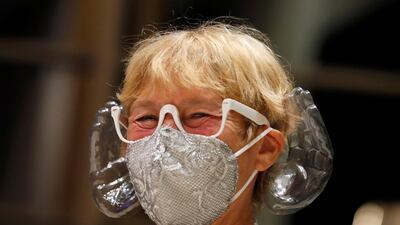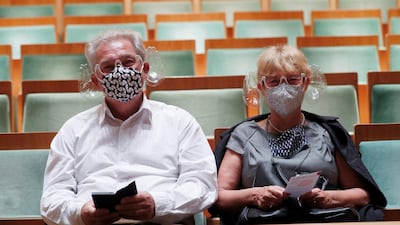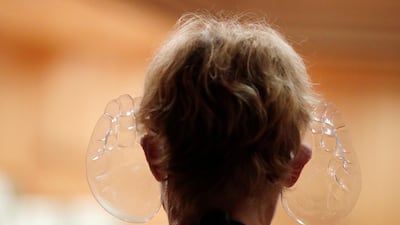When he saw a sea of face masks around Budapest, Hungarian orchestra conductor Ivan Fischer had an idea – turn a pandemic necessity into a tool of music appreciation.
Fischer's music-enhancing face mask has two plastic cups shaped liked life-size hands attached to the mask's strings and designed to fit around the wearer's ears.
The innovation allows concert audiences in the age of the coronavirus to enjoy improved acoustics.
"I got to this idea that it should look like a hand because when we put our hands here," he said, cupping his palms around his ears, "we always understand the other person easier, we hear the consonants and the music sounds much more beautiful."
Speaking as the orchestra rehearsed for an evening of Beethoven and Strauss, Fischer,chief of the Budapest Festival Orchestra, said his masks helped to emulate church acoustics, with warmer undertones and clearer, sharper contours.
Fischer's invention is proving popular with audiences, with dozens of people wearing the mask as they took their seats at last Friday's performance.
The acoustic mask, which costs 8,000 forints (Dh97) if ordered through the orchestra's website, comes in glitter and black-and-white versions.
Audience member Zsuzsa Hunyadi-Zoltan said the sound was better with the special mask.
"It focused the music more. I tried it, I took it off and put it back on and one can clearly feel the difference," she said.
The specs
Engine: 1.5-litre turbo
Power: 181hp
Torque: 230Nm
Transmission: 6-speed automatic
Starting price: Dh79,000
On sale: Now
Tips to stay safe during hot weather
- Stay hydrated: Drink plenty of fluids, especially water. Avoid alcohol and caffeine, which can increase dehydration.
- Seek cool environments: Use air conditioning, fans, or visit community spaces with climate control.
- Limit outdoor activities: Avoid strenuous activity during peak heat. If outside, seek shade and wear a wide-brimmed hat.
- Dress appropriately: Wear lightweight, loose and light-coloured clothing to facilitate heat loss.
- Check on vulnerable people: Regularly check in on elderly neighbours, young children and those with health conditions.
- Home adaptations: Use blinds or curtains to block sunlight, avoid using ovens or stoves, and ventilate living spaces during cooler hours.
- Recognise heat illness: Learn the signs of heat exhaustion and heat stroke (dizziness, confusion, rapid pulse, nausea), and seek medical attention if symptoms occur.
Scoreline
Al Wasl 1 (Caio Canedo 90 1')
Al Ain 2 (Ismail Ahmed 3', Marcus Berg 50')
Red cards: Ismail Ahmed (Al Ain) 77'
In numbers: PKK’s money network in Europe
Germany: PKK collectors typically bring in $18 million in cash a year – amount has trebled since 2010
Revolutionary tax: Investigators say about $2 million a year raised from ‘tax collection’ around Marseille
Extortion: Gunman convicted in 2023 of demanding $10,000 from Kurdish businessman in Stockholm
Drug trade: PKK income claimed by Turkish anti-drugs force in 2024 to be as high as $500 million a year
Denmark: PKK one of two terrorist groups along with Iranian separatists ASMLA to raise “two-digit million amounts”
Contributions: Hundreds of euros expected from typical Kurdish families and thousands from business owners
TV channel: Kurdish Roj TV accounts frozen and went bankrupt after Denmark fined it more than $1 million over PKK links in 2013
Conflict, drought, famine
Estimates of the number of deaths caused by the famine range from 400,000 to 1 million, according to a document prepared for the UK House of Lords in 2024.
It has been claimed that the policies of the Ethiopian government, which took control after deposing Emperor Haile Selassie in a military-led revolution in 1974, contributed to the scale of the famine.
Dr Miriam Bradley, senior lecturer in humanitarian studies at the University of Manchester, has argued that, by the early 1980s, “several government policies combined to cause, rather than prevent, a famine which lasted from 1983 to 1985. Mengistu’s government imposed Stalinist-model agricultural policies involving forced collectivisation and villagisation [relocation of communities into planned villages].
The West became aware of the catastrophe through a series of BBC News reports by journalist Michael Buerk in October 1984 describing a “biblical famine” and containing graphic images of thousands of people, including children, facing starvation.
Band Aid
Bob Geldof, singer with the Irish rock group The Boomtown Rats, formed Band Aid in response to the horrific images shown in the news broadcasts.
With Midge Ure of the band Ultravox, he wrote the hit charity single Do They Know it’s Christmas in December 1984, featuring a string of high-profile musicians.
Following the single’s success, the idea to stage a rock concert evolved.
Live Aid was a series of simultaneous concerts that took place at Wembley Stadium in London, John F Kennedy Stadium in Philadelphia, the US, and at various other venues across the world.
The combined event was broadcast to an estimated worldwide audience of 1.5 billion.





